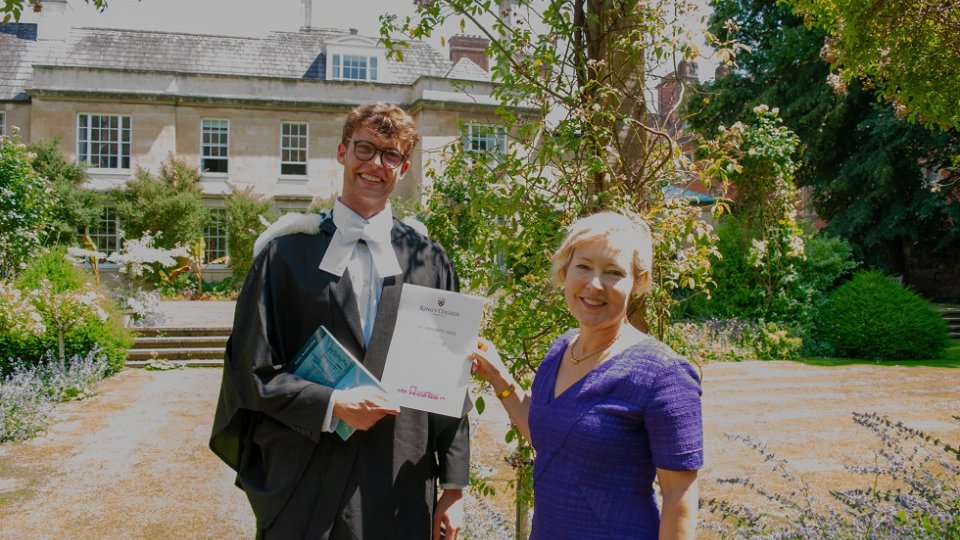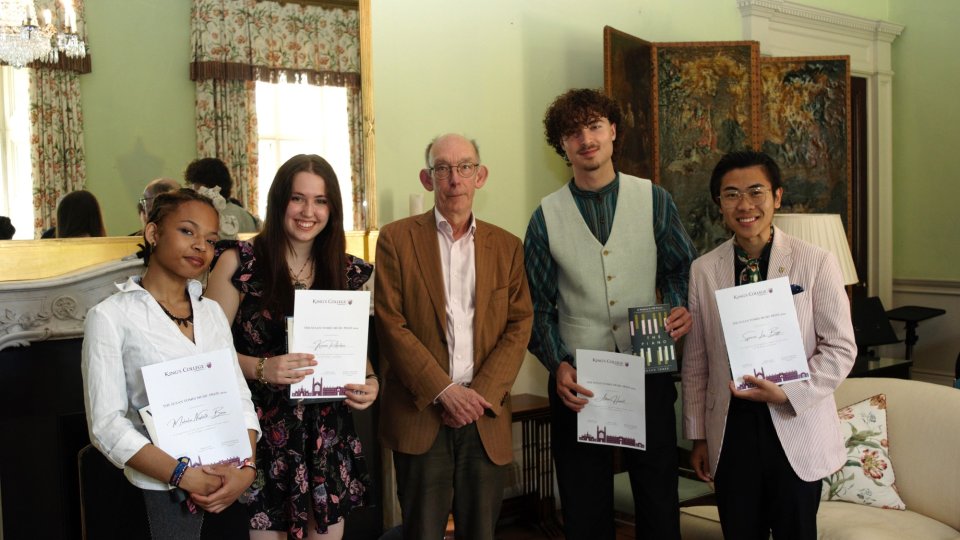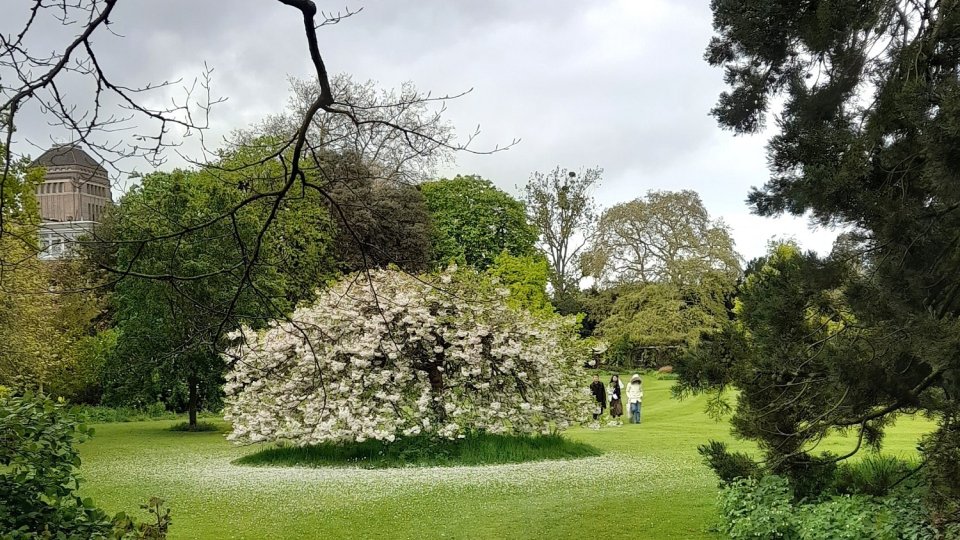Below you can find information about important steps for applicants for the full undergraduate admissions process at King’s College. This also includes useful supporting documentation where appropriate.
We recommend you read this page and additional relevant sub-pages in their entirety to ensure you know exactly what next steps you need to be taking and when.
For most students, the first thing to do is to apply through UCAS. This is where you will submit your personal details, your personal statement and ask someone who knows your academic work to submit a reference for you. Although what you submit in your UCAS application is shared to all the universities you apply to (you can choose 5 UK universities to apply to through UCAS), it is very important to note that the Cambridge application deadline is earlier than for most other UK universities. UCAS typically opens up to receive all applications (regardless of whether the university has an early deadline or not) at the beginning of September with the deadline for applications for those applying to Cambridge being 15th October 2024 by 18:00 (UK time). To find out more detailed information, please read the page linked below.
Admissions assessments are used as an additional factor to help us assess the overall strength of an application. There are two types of assessments we use in the application process depending on which subject you apply for: written assessments: pre-registration and written assessments: Cambridge College registered. If the subject you are applying for has a pre-registration assessment, from 2024 onward you must register yourself for the assessment by the relevant deadline. Your school can't do this for you. The deadlines vary by subject so please do check the assessment for your subject carefully (it is your responsibility to ensure that you are registered for this). You take the assessment at an assessment centre rather than at school. Dates will be published closer to the time.
If the subject you are applying for has an College registered assessment, you sit this test (online) if you are invited for interview, usually in the week before your interview takes place - the arrangements for this assessment will be made for you.
Further information about these assessments, as well as information for those who normally get exam adjustments for a disability/Specific Learning Difficulty/long-term illness, is provided in the pages below.
Shortly after submitting your UCAS application, you'll be asked via email to complete an online additional questionnaire. All students must submit this form by the deadlines set in order to make a valid application to the University of Cambridge. The deadline will be 18.00 (UK time) on 22 October 2024.
The additional questionnaire enables us to collect information that is not part of the UCAS application however is useful for us to know. For example, you will be asked to submit the modules/topics that you have covered as part of you current qualifications (e.g A Levels, IB or equivalent) which can be helpful for interviewers.You may also be asked to send a transcript with your additional questionnaire - this will be made clear to all those applicants this is needed from. Overall, this form provides us with complete information for all applicants so we can assess an application fully.
If you have any choral experience and would like to be considered for a choral scholarship later on, please use the additional personal statement on our questionnaire to highlight your choral experience.
Applicants for some subjects will need to send us examples of written work. You can find out which subjects this applies to along with further helpful information in the pages linked below. We will provide more information about how to submit written work shortly. Don't worry - applicants will be given full details of the required forms etc. once they have applied. If you are overseas at the point of application and are worried about documents arriving on time, please do contact the Admissions Office as soon as possible so we can provide advice in these circumstances.
In November we assess applications and invite applicants for interview (we interview the vast majority of applicants).
From 2024 onwards, all applicants, whether they are based in the UK or Overseas, will undertake an interview in-person in King's College, Cambridge. If a candidate knows they would be unable to travel to Cambridge for an exceptional reason they must let us know via the survey that will be sent to all applicants following submission of their application. We are willing to consider remote interviews in these circumstances, but it is up to the candidate to explain why such an accommodation is required. Reasons that may be considered exceptional for this purpose include health/disability, Visa constraints, and/or affordability of travel (although see below for support with travel costs for UK based candidates). Please note: If you are requesting an online interview, you may be asked to submit supporting documentation, such as evidence of household income, or details about the costs of your travel.
The orientation and aims of the interview are the same, regardless of format, and students will not be disadvantaged in any way by the format of their interview. Nor will candidates be disadvantaged in the Winter Pool, by reason of the interview format used by their college of application.
Accommodation and Meals
If you are coming to King’s for your interview, and it is not possible for you to make the round trip to Cambridge in a single day, we may be able to offer you free overnight accommodation as well as dinner (on your day of arrival) and breakfast (on the day of your interview) in College. We are only able to offer accommodation to applicants and not to any accompanying parents, guardians or friends. Candidates who need overnight accommodation should let us know using the reply form included with the email interview invitation. We only offer accommodation on the night before the interview.
Candidates who are eligible for Free School Meals will be able to eat lunch for free, using the King’s servery, regardless of whether or not they are staying in College overnight. These candidates can pick up a voucher from the Students’ Help Desk when they sign in. In addition, our Student Helpers will run daily trips to Sainsbury’s at 12 noon for any student (including FSM students who would prefer not to eat in the servery) interested in purchasing their lunch in advance of interview. These trips will depart at 12 noon from the Porters’ Lodge.
Traveling to Cambridge
If you are invited for an in person interview, you will need to make your own way to Cambridge. We can't provide support in looking for connections or booking trains etc.
There is no parking available at King’s. Parking in the centre of Cambridge is very expensive, there’s a lot of one-way streets and bus gates which could get you fined if you drive down those, so if driving we would recommend using one of the many park and rides around the city.
The entrance to King’s College is on King’s Parade, the postcode is CB2 1ST. On google maps it is about opposite Fudge Kitchen, and on What3Words it is ///headed.master.evenly.
Travel Costs
As traveling to Cambridge can be costly, we are willing to reimburse eligible UK students in respect of travel costs for public transport, on the proviso that students make use of the least costly option. UK students are eligible for reimbursement if they are a UK student and any of the following apply: (i) they are eligible for free school meals, (ii) they are from a family with an income of below £30,000, (iii) they are estranged from their family, or (iv) they are in local authority care. If this applies, the candidate will be able to indicate their eligibility in their interview invitation reply form. You will be asked to submit appropriate evidence, which will be kept confidential from your interviewers throughout the admissions process. Candidates must then send us an online or paper receipt, along with their bank details, and we will reimburse them as soon as possible. We are unable to reimburse travel costs for non-UK-based applicants.
What to expect?
When you have your interview, we will encourage you to talk about your academic interests and ideas. We are looking for intellectual ability, aptitude for the subject, curiosity and commitment. So expect interviewers to ask a range of questions relating to the work or reading you have done, both at school and outside it. Do not be surprised if they ask you to justify or elaborate on what you say.
If they introduce issues that are new to you, they are not trying to catch you out, but instead wish to discover how you would deal with new ideas or an unfamiliar topic. They will not expect you to know all the answers: simply to think hard and have a go. Similarly, any assessment we ask you to take while here is designed to show us your academic potential and aptitude. Apart from the small number of subjects that require some preparatory reading, the interviews and Cambridge College Registered admissions assessments require no specific preparation.
We interview most candidates and in some subjects we ask you to send written work (see the subject pages for further details). Interviews are not designed to test a particular syllabus but more generally to find out how you work and how you would respond to the kind of academic challenges you would meet as an undergraduate at King's - interviews are designed to emulate the supervision system here at Cambridge. We can find out a lot about your interests, motivation and potential by discussing your subject with you.
The Interview
In this film, we invited four successful applicants back to Cambridge to share their interview experiences. We asked experienced interviewers in four subject areas -- Geography, Human, Social and Political Sciences, Medicine and Natural Sciences (Physical) - to conduct a mock interview with each student. Footage from all four interviews is shown in the film, together with commentary from the interviewers in order to explain the interview process in more detail and give you a sense of what to expect when you come to Cambridge for interview. Find out more at…
Offers of places are made in January. An offer may be 'conditional' (dependent on you achieving certain exam grades) or, if you have already taken your final school exams, an offer may be 'unconditional' (without academic conditions attached).
If we are not able to make an offer to you, but think that you deserve a place at Cambridge and would cope with the demands of the course were you to be admitted, we place your application in the Pool. Here other colleges can consider your application. Sometimes other colleges make offers to Pool candidates immediately and sometimes they call candidates back for a second interview in early January. King's works hard to support pooled candidates and we are often successful in placing them. However, being placed in the pool is not a guarantee of an offer; even the most competitive candidates may be unsuccessful in the pool, as success is highly dependent on the numbers of other pooled candidates in the pool, and the relative demand of the other colleges.
We aim to offer admission to undergraduate applicants of the greatest academic potential. We receive many applications of very high quality, but cannot offer everyone a place. This means that the number of unsuccessful candidates – even those with very strong applications – is therefore also high. We take time considering all elements of your application (including formal applications, tests, submitted work and interviews, and relevant contextual information), to ensure that admissions decisions are focussed on academic ability and potential, and all staff involved in the process are trained to treat applicants fairly, consistently, and professionally.
Occasionally, however, an applicant may be dissatisfied with the decision not to offer them a place and have grounds to believe this stems from procedural error (submitting an “appeal”), or they may be dissatisfied with some other aspect of the management of their application (submitting a “complaint”).
This document constitutes the Cambridge Colleges’ shared approved policy and procedure for the managing of such appeals and complaints: https://www.undergraduate.study.cam.ac.uk/files/publications/2023_undergraduate_admissions_appeals_and_complaints.pdf
Please note that if you believe that there was a serious procedural error in the manner in which an assessment, or interview was conducted, or a serious technological problem during interview, this should be notified to us as soon as reasonably practicable following the error’s taking place. This will ensure that, where appropriate, we can arrange for the assessment, or interview, to be repeated, so as to rectify the problem. Failure by us to take into account these errors when not notified to us in a timely manner, will not be considered valid grounds for appeal or complaint.
King’s College operates the following policy on providing feedback to unsuccessful applicants.
Candidates who are rejected before interview will not be able to request individual feedback on their application.
The Admissions Tutor will provide individualised feedback to candidates who have been interviewed by the College, but have failed to secure an offer who have been highlighted to us through the admissions process as eligible for free school meals, and/or as care-experienced; and general feedback to referees of all unsuccessful interviewees from schools where fewer than five applicants have been made an offer from Oxford or Cambridge in recent years (as indicated by our Low Cam/Ox flag). For details, see:https://www.undergraduate.study.cam.ac.uk/apply/after/contextual-data. This feedback will be supplied by the end of February. You do not need to request feedback if you fall in either of those categories.
At King’s, and across the University, there are a finite number of places available. We select candidates holistically, admitting students who demonstrate the greatest academic potential relative to other applicants in a given admissions round. This means that many students miss out on a place simply because, in our judgement, other applicants are stronger. We hope that applicants and their referees will take heed of this, and will not routinely wish to request feedback on their application. Having said this, any particular requests for feedback for applicants who do not fall into the above categories can be made by a student’s referee, using our online form. The deadline for requesting feedback in 2024 has now closed. The link to the form for requesting feedback in 2025 will be provided in October 2024.
We are unable to enter into any further correspondence about feedback, either now or once outcomes have been released; you may wish to keep a copy of this policy for your records.
Our applicants come from a diverse range of backgrounds and we aim to provide as much advice as possible to help all prospective students. Some of our advice is tailored to particular groups of you for which you can find information to below. Should you not be able to find the answers you are looking for in these pages or, have a specific question you want answering, we would welcome you to contact the admissions team at: undergraduate.admissions@kings.cam.ac.uk








